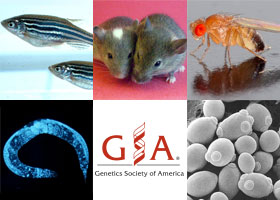Update: This letter of support received 11,078 signatures and has been presented to Dr. Francis Collins. Thank you for your interest. Continue to follow GenestoGenomes.org for updates on this issue.
Leaders of several model organism communities, working with the Genetics Society of America (GSA), have come together to write a Statement of Support for the model organism databases (MODs) and to urge NIH to revise its proposal to reduce funding for MODs. We ask all scientists who value the community-specific nature of the MODs to sign this ‘open letter’ found below.
Dear Dr. Collins and NIH Institute Directors,
We are amongst the more than ten thousand NIH-supported researchers who study ‘model organisms’ in order to improve human health and make fundamental discoveries of biomedical significance. Model organisms—including budding yeast, fruit flies, nematode worms, zebrafish and rodents—have had an incalculable impact on the current knowledge of biological mechanisms and their translation to treat human disease. Recognizing the power and efficiency of model organism research, NIH spends more than $5 billion annually on grants that center around these organisms, including $1 billion on non-mammalian models.
Model Organism Databases (MODs) are the critical infrastructure that underpins these studies. Such databases—including FlyBase, WormBase, Saccharomyces Genome Database, ZFIN, Mouse Genome Database, and Rat Genome Database, along with Gene Ontology (GO)—are much more than assemblages of genomic information. They serve as hubs of collective community knowledge, integrating and curating the ever-increasing literature. They develop and implement tools for analysis of complex datasets, pioneering approaches to ‘big data’ that (as with the genome projects in the 1990s) are then applied to human biology. Moreover, through their open and easily accessible web interfaces, they are the chief portals by which this information is shared and disseminated with researchers, students, and the worldwide scientific community.
As individual researchers, we use MODs daily to leverage this accumulated knowledge to drive our own cutting-edge discoveries. We especially rely on the MOD’s high-quality, up-to-date, and comprehensive nature in collating myriad data that are impossible for researchers alone to access. Such community-driven efforts are in part why model organisms have been so successful in advancing knowledge. Without the systematic organization of the MODs, each of our research efforts would be drastically impeded and in some cases impossible, slowing the pace of discovery and reducing the efficient use of NIH funding.
We enthusiastically support the initiative to integrate elements of the existing MODs and to increase accessibility of the information contained therein, especially to medical researchers. However, we are deeply concerned by reported plans to reduce overall support for MODs themselves. Each MOD collects, curates, analyzes, and disseminates unique sets of data that reflect the unique biology and specific research usage of their model organism. We strongly advocate for the continuation of adequate and sustained funding to the individual MODs to maintain essential and species-unique information and to respond to new data initiatives for their communities. We further encourage inclusion of MOD community representatives in future discussions regarding the MODs. Together, this structure will provide the strongest foundation for future advances in our understanding of fundamental biology and human disease.
We applaud NIH leaders’ recent affirmation of basic science as the ‘bedrock of progress’ in biomedicine. Model organisms have long been at the heart of the basic science portfolio, and research with them is more relevant than ever in addressing cutting-edge problems, from the complex relationships between genotype, environment, and phenotype, to understanding the structure and function of the brain, to creating efficient and manipulable human disease models. In particular, deciphering the role of disease-relevant genetic variants increasingly depends on model organism-based functional studies. Moreover, model organism research fosters the unanticipated discoveries that regularly revolutionize biology.
MODs form the scaffold on which these key scientific advances have been and will continue to be made. At less than $20 million annual support, MODs are highly cost-effective resources that save researchers countless hours of effort extracting, collating, and computing information. They also facilitate access of human geneticists and clinical researchers to the rich functional information obtained from model organisms. NIH’s support for the MODs over the last two decades has enabled a bevy of pivotal discoveries that lie at the true heart of the NIH mission. We urge you to continue the far-sighted policy of support for vital research infrastructure.
Relevant Reading:
Funding for model organism databases in trouble














